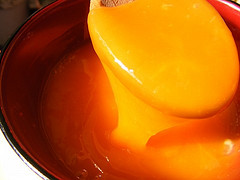
flic.kr/p/8sYqxK
Have you ever seen lecithin effects in action? Try putting a piece of chocolate or an energy bar inside the freezer. Just wait a few minutes before taking it out. You will see that the whole bar is covered in white. Yes, that’s lecithin effects in action right there!
Often used as a food additive, lecithin was first derived from egg yolk in 1950 during its discovery by Maurice Gobley , a French scientist. In fact, that is how it got its name – lethikos, the Greek term for “egg yolk.” But by the end of the 1930s, it was soon found that lecithin may also be extracted from crude soybean oil after it has undergone a process called hexane extraction.
The Effects of Lecithin as an Emulsifier
The food industry is among the first industries that uncovered the wonderful lecithin effects of this natural emulsifier. Since its discovery, it has been used in foods such as chocolate, margarine, cheese, and salad dressings. Acting as an emulsifier, the lecithin effects help combine fats with water and keep them from separating. When you put the chocolate bar in the freezer, the low temperature causes the lecithin effects on the fat to fall apart. That’s why the fat rises to the top, giving the chocolate that whitish tinge.
Besides being found in soybeans and egg yolks, lecithin is also present in all living cells of the body. Lecithin is, in fact, a complex mixture of phospholipids, the most important of which is phosphatidylcholine, which is the number one source of choline. With its emulsifying lecithin effects, the substance is known to help keep fatty substances in bile produced by the liver. Bile is a kind of juice that your body secretes to aide in digestion and help your body absorb valuable nutrients, as such, lecithin plays a role in the normal digestive processes of your body.
Steven Zeisel, M.D., PhD., professor and chair of the department of nutrition at the University of North Carolina in Chapel Hill, notes that the lecithin effects of this great emulsifier helps maintain the structural integrity of cells. Lecithin is one of the primary components that make up the cell membrane or outer covering of our cells.
“Without lecithin, nothing would survive, because you wouldn’t be able to separate the various compartments within cells, nor would you be able to separate cells from each other,” he added.
Lecithin Effects and Choline
The word lecithin actually has several various meanings. The generic name refers to lecithin, the compound of lipid and phosphate acid mixtures used in the commercial food industry. However, in , biochemistry, chemistry and other similar sciences, the term takes on a whole different meaning. Often, lecithin is used synonymously with choline, soy lecithin, vegilecithin, vitrellin, kelecin, lecithol, and phosphatidylcholine. However, strictly speaking, choline is actually just a component of lecithin – a major one, that is.
Out of the many chemicals found in lecithin, the most essential and the most studied is choline. For many years, the lecithin effects of choline has been the subject of countless studies and extensive research, all investigating the purported advantages of lecithin. To name a few, lecithin effects have been investigated on the following conditions: stroke, dementia, Alzheimer’s Disease, substance abuse, brain infection, injury to the brain, and spinal cord injury.
Tagged with: lecithin benefits • lecithin from soya
Filed under: Lecithin